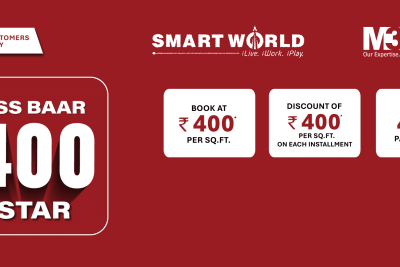The pandemic has taught realty developers to adopt digital transformation and increase profitability. Experts say more, read on…
The use of technology for expediting the construction work is not new. But the outbreak of Covid-19 has prompted builders to make use of latest technology in a bigger and more effective way. One key aspect for the sector to tide over delay in project completion due to shortage of labour is to apply more and more technology.
LATEST TECH INNOVATIONS
The latest technological innovations that have captured imagination of construction industry worldwide are Virtual Realty/Robotics, 3D printing and prefab construction. Platforms like BIM (Building Information modeling) have found acceptance with every design and development office. New products and technologies enabling use of robotics to replace manual effort, 3D printed building or building elements and prefab construction are going to define the upcoming decade in the construction industry.
Talking about the use of technology in construction sector, Taha Ansari, managing director, Project Management, Colliers India, says, “The technological innovations are very much into our modern era day-to-day affair. The construction industry is not far behind for the same.” Here are some latest technological innovations, which are being widely adopted by developers, for modern day’s constructions.
Lean and green construction:
The concept of lean and green construction, which is environment-friendly, energy-efficient, an operationally cost-effective, involves using construction materials that are environmentally responsible and resource-efficient throughout a building’s life cycle, right from construction to operation, maintenance, renovation, and demolition. It not only fulfills a developer’s social responsibility arid obligation but is also cost-efficient and in high demand.
Drone Technology: The drone technology is used for better visibility of construction sites for various activities, such as building surveys, construction site inspection, health and safety induction, maintenance inspection, project progress report, promotional photography, live feed, and virtual walk-through, site logistics, ‘thermal imaging recordings, etc.
Prefabricated Construction: Offsite construction is becoming a big trend, gaining further momentum post-Covid as the manufactured buildings are already built in a particular way. The manufacturing is done in a large factory, with social distancing. The equipment that is used, like ceiling cranes, conveyors, and lifts, are specifically designed to let fewer workers move larger components, reducing worker proximity and labor costs.
Artificial Intelligence [Al]: Artificial intelligence models, which are now widely practiced by developers, becoming more popular as they help construction managers and projects, budget forecast, and risk.
Cloud and Mobile Technology: Along with AI, mobile and cloud technology provides efficiencies and brings productivity to the construction industry. Project managers and supervisors can share data, images and videos on the cloud from their mobile devices, which enables stakeholders of the project to conned in real-time and review the progress, quality and safety unbounded by time and location.
3D Printing: The use of 3D printed materials will become a trend in the construction industry along with prefabricated ones. These materials are used wherein more precise finishing is required and saves time in executing the work.
There are a greater number and variety of construction project delivery methods available today than ever in the history of the world. Developers and present savvy homebuyers who take advantage of the most favorable delivery methods are more likely to achieve significant advantage with timely delivery of their home. Hetal Josh, president, EPC, Piramal Realty, avers, “Today prominent developers extensively leverage cutting-edge technologies to deliver homes that conform to the highest standards of quality and safety. Some of them are – 3D BIM Modeling, Jump From, steel girders, earthquake-proof foundations, etc. Jump Form System is a technology that is used to construct high-rise towers. This helps in reducing the slab cycle time for high-rise buildings that have more than 50 storey’s. Developers also use Aerodeck/RMD panels and Aluminum formwork for typical slabs enables to achieve an earlier slab completion. Alu-form and Tunnel formwork are more cost-effective and serve as the best fit for the mass/affordable housing sector’.
Today, since approximately 70 per cent of constructions are in the form of components, it takes us into the realm of ‘just-in-time’ manufacturing and I delivery. This cuts down on-site schedules and reduces transit and waste “Overall, this combination of core/ column/slabs and wind protection with the logistics network enables a consistent, continuous, safe and speedy work flow. Competent technology, ease of
Operation and handling, high-end performance and safeguarding features of all the systems will surely have a greater contribution towards a robust construction,’ Joshi adds .
Austin Roach, chairman, RBD Shelters, further says, “In construction, the MIVAN technology is fast catching up to speed up the construction time. It is an aluminum form work system, where slabs and walls are cast in-situ in concrete. Another development is prefab technology both of these construction techniques not only offer speed but also quality. They are believed to be far more stable and sturdier when compared to traditional construction.”
Apart from these, the pandemic has also accelerated the adoption of multiple DU and BIM platforms at the administration level. These technological interventions, which began way before the pandemic, have now enabled traditional real estate developers and contractor companies to modernise supply chains, hiring, fund deployment and so much more, just like tech companies. This cuts out further delays and minimises loss due to human error.
WHAT IS MIVAN TECHNOLOGY
MIVAN technology is one of the much talked about elements in the construction industry. Conventional formwork systems are gradually being replaced with technologies like aluminum formwork, jump forms etc for quicker execution. Jipu Jose James, executive director, JLL Work Dynamics, India, says, “MIVAN technology is a type of aluminium formwork which uses tailor—made aluminium panels for cast—in—situ fully concrete structure. This system is quick to execute and cost effective for high repetitions and hence are being commonly used in residential complexes and mass housing projects in India. Since the structure formed out of MIVAN systems are complete concrete structures, there is no requirement of blockwork and plaster, thereby saving considerable time and cost in the project. The better quality of finishing and high salvage value of the form work, post use in construction, MIVAN has become the preferred form work system in high rise residential and mass housing projects in India!




